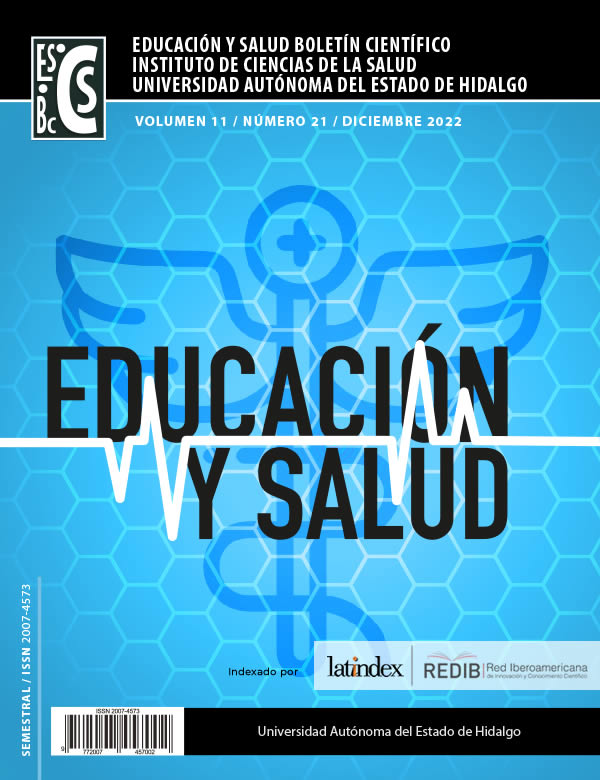Judges' validation of an Emotional Education Program for Adolescents in times of the COVID-19 pandemic
Abstract
The objective of this research was to carry out the validation by judges of an emotional education program, as a support to address mental health problems derived from the emotional alterations that the confinement caused by COVID-19 brought to the adolescent student population. It is a quantitative research with a descriptive scope and a cross-sectional design. A total of ten judges from five universities nationwide participated in the study, who were selected based on a non-probabilistic sampling by experts. The program was designed based on the theoretical model of emotional competencies proposed by Rafael Bisquerra. Eight sessions lasting eighty minutes each were generated. A questionnaire prepared expressly for validation by expert judges was used. The results indicate that 100% of the judges considered that the program is adequate for its application in terms of objectives, procedure and expected results. It is concluded that the design of the program is adequate and suitable for its application, anticipating that adolescents will benefit from their participation.
Downloads
References
Aguilera, P. (6 y 7 de marzo de 2008). The Social and Emotional Aspects of Learning (SEAL): La educación emocional en Inglaterra. [Presentación en papel] IV Jornades d’ Educació Emocional. EDUCACIÓ PER A LA CIUTADANIA: la dimensió emocional. https://docplayer.es/9308011-The-social-and-emotional-aspects-of-learning-seal-1-la-educacion-emocional-en-inglaterra.html
Bisquerra, R. (2006). Orientación pedagógica y educación emocional. Estudios sobre Educación, 11, 9-25.
Bisquerra, R. (2011). Educación emocional. PADRES Y MAESTROS. (337), 5-8.
Bisquerra, R. & Pérez, N. (2007). Las competencias emocionales. Educación XXI, 10, 61-82. https://doi.org/10.5944/educxx1.1.10.297
Brackett, M. & Castillo, R. [Educarchile] (6 de mayo de 2021). Charla online - Método Ruler: Educación en Inteligencia Emocional. [Archivo de Vídeo]. Youtube. https://www.youtube.com/watch?v=JDPF3oK3bd8
Cabero, A. J. & Llorente, C. M. C. (2013). La aplicación del juicio de experto como técnica de evaluación de las tecnologías de la información (TIC). Revista de Tecnología de Información y Comunicación en Educación, 7 (2) pp.11-22. http://tecnologiaedu.us.es/tecnoedu/images/stories/jca107.pdf
Casassus, J. (2017). Una introducción a la educación emocional. RELAPAE, (7), 121-130.
Cabello, E., Pérez, N. Ros, A. & Filella, G. (2019). Los programas de educación emocional happy 8-12 y happy 12-16. evaluación de su impacto en las emociones y el bienestar. REOP, 30(2), 53-66.
Espinosa, C., & Gregorio, M. (2018). La educación emocional en Educación infantil. Publicaciones didácticas. (100), 84-92.
Fernández-Berrocal P. (2021). Inteligencia emocional. Biblioteca de psicología. Bonallletra Alcompas S. L..
Larrea-Schiavon, Silvana, Lina López-Lalinde, Isabel Vieitez Martínez, Ricardo Regules, Juan Pablo Gutiérrez, René Nevárez, Cristina Mac Gregor, Pablo López, Nicole Haberland, & Thoai Ngô. (2021). Resultados del estudio sobre violencia en la era COVID-19 (VoCes-19): Línea base reporte." Mexico: Population Council. https://doi.org/10.31899/sbsr2021.1049
Naciones Unidas. (13 de mayo de 2020). Informe de políticas: La COVID-19 y la necesidad de actuar en relación con la salud mental. https://www.un.org/sites/un2.un.org/files/policy_brief_-_covid_and_mental_health_spanish.pdf
Organización Panamericana de la Salud (15 de septiembre, 2021). Los niños, niñas y adolescentes están profundamente afectados por la pandemia de COVID-19, afirma la directora de la OPS. https://www.paho.org/es/noticias/15-9-2021-ninos-ninas-adolescentes-estan-profundamente-afectados-por-pandemia-covid-19
Organización Mundial de la Salud. (2022). Informe mundial sobre salud mental. https://www.who.int/es/publications/i/item/9789240050860
Pérez-Escoda, N., Fillella, G., Alegre, A. & Bisquerra, R. (2012). Desarrollo de la competencia emocional de maestros y alumnos en contextos escolares. Electronic Journal of Research in Educational Psychology. 10(3), 1183-1208.
Sánchez-Calleja, L., García-Jiménez, E., & Rodríguez-Gómez, G. (2016). Evaluación del diseño del programa AedEM de Educación Emocional para Educación Secundaria. RELIEVE. 22 (2), 1-25. http://dx.doi.org/10.7203/relieve.22.2.9422
Viloria, C. (2005). La educación emocional en edades tempranas y el interés de su aplicación en la escuela. Tendencias Pedagógicas. 10, 109-123.
Yale University. (s.f.). What is RULER? – RULER Approach. Recuperado el 9 de octubre de 2022, de https://www.rulerapproach.org/about/what-is-ruler/
Copyright (c) 2022 José Salvador Jiménez-Azpeitia, Norma Angélica Ortega-Andrade, Andrómeda Ivette Valencia-Ortiz, Flor Angélica Resendiz-Canales

This work is licensed under a Creative Commons Attribution-NonCommercial-NoDerivatives 4.0 International License.












